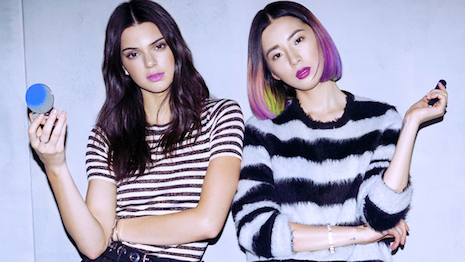- About
- Subscribe Now
- New York,
August 21, 2018

 Estée Lauder enlisted Korean-American Irene Kim as a brand ambassador. Image credit: Estée Lauder
Estée Lauder enlisted Korean-American Irene Kim as a brand ambassador. Image credit: Estée Lauder
South Korea is one of the most important fashion markets in Asia, but luxury brands need to understand the culture to capture consumers' attention.
According to Fashionbi's "Fashion Industry in South Korea: Understanding Trends and Opportunities in South Korean Fashion Industry" report, social media and celebrity have different influences in South Korea than other Asian countries. To be successful in South Korea, luxury brands need to know what most appeals to local shoppers.
"[Luxury brands] should decide either to enter or not the market according to its long-term strategy and the sales goals," said Yana Bushmeleva, chief operating officer at Fashionbi, Milan. "What we can say is that South Korea is still a relatively unexplored market by the international brands and the competition here can be lower compared to Japan and China."
Online and mobile shopping
Since the 1960s, family conglomerates have dominated the South Korean economy, including Samsung, LG and Hyundai. While these companies are primarily known for their electronics, their fashion divisions are the most popular way luxury brands enter the South Korean marketplace.
"Many international brands entered the market thanks to the agreements with the local partners such as Samsung Fashion C&T Fashion Group, Shinsegae International, Handsome Group and soon," Ms. Bushmeleva said. "These conglomerates can afford the significant investments for the brand launch and promotion."
The Dongagaemum Design Plaza (DDP) in Seoul, South Korea
South Korea's fashion market makes annual sales of 20 trillion won per year, or $18 billion at current exchange.
The fashion market is expected to grow 3 percent in 2018 from 2017, partly due to the popularity of mobile ecommerce. In November 2017, e-sales in South Korea hit 10.8 trillion won, or $9.6 billion at current exchange.
South Korea's apparel, shoes, accessories, sportswear and cosmetics sectors all saw more sales in 2017 than 2016. Casual wear and bags are two areas that are seeing the fastest growth.
Online shopping turnover of leather goods increased 29 percent. Image credit: Louis Vuitton
Street style brands are expected to propel casual wear to a total 15 trillion won in 2018, or $13 billion at current exchange. Online shopping for bags increased by 34 percent and grew 57 percent in mobile shopping in 2017 compared to 2016.
The overwhelming majority, 88 percent, of South Korean consumers trust influencers recommendations, and 15 percent of shoppers make purchases after seeing a product on a social network.
Luxury brands in South Korea
The slowing of China’s economy has afforded neighboring countries such as South Korea an opportunity to become a tourist destination, which in effect has brought increased exposure to the country’s products.
South Korean beauty products in particular have seen a rise in popularity, at the expense of Western brands who entered the Chinese market when the playing field was more fruitful. According to L2’s “The Beauty China: The Rise of Korean Brands” Insight Report, Western skincare and color cosmetics have seen share erosion while interest in South Korean beauty is skyrocketing, now accounting for nearly a quarter of cosmetic imports to China (see story).
Seoul has also attracted numerous luxury retailers for special pop-ups and exhibits.
Last fall, Max Mara’s Coats! opened at the Zaha Hadid-designed Dongagaemum Design Plaza (DDP).
Visitors to the Max Mara exhibit were welcomed by a site-specific digital installation by Korean artist Yiyun Kang in a work that explored relational environments. In her work, Ms. Kang explored the Italian fashion label's production process using imagery from the brand’s archives and its iconic camel fabric (see story).
Previously, Louis Vuitton’s "Volez Voguez Voyagez" retrospective exhibited at the DDP. Louis Vuitton added a chapter to the free exhibit devoted to South Korea (see story).
The stable luxury market and tech-savvy population makes South Korea ideal for mobile marketing and ecommerce. An increase in Chinese tourists looking to purchase luxury goods while abroad makes it even more important for brands to focus their attentions on South Korea (see story).
"South Korea is one of the most digitally-advanced countries," Ms. Bushmeleva said. "More than 63 percent of the online shoppers make purchases via smartphones."
Share your thoughts. Click here